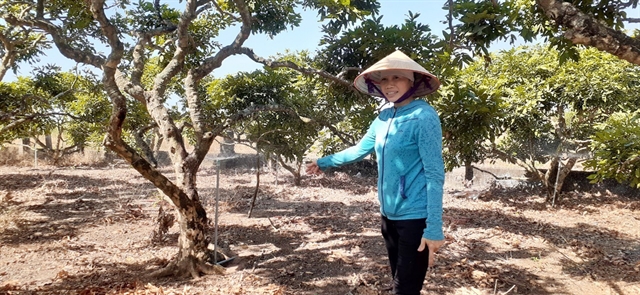 Society
Society

 |
| A longan orchard is equipped with an efficient irrigation system in Bà Rịa – Vũng Tàu Province. — VNA/VNS Photo Hoàng Nhị |
HCM CITY — Using machines to cultivate the country’s fruit still has limitations and the harvesting stage is done mostly by hand, experts said.
Fruits are one of the country’s key agricultural products for export and the country has 1.18 million hectares of fruits as of last year, according to the Ministry of Agriculture and Rural Development’s Department of Economic Cooperation and Rural Development.
Speaking at a recent seminar held in Tiền Giang Province, Vũ Văn Tiến, deputy head of the department, said mechanising the country’s fruit cultivation is focused on land preparation, tending, harvest, transportation and processing, and post-harvest preservation.
Mechanisation for land preparation is used on more than 90 per cent of the country’s total fruit area and 70-80 per cent for tending, he said.
In the harvesting stage, most fruits are harvested manually, he said.
To increase yield and quality, reduce labour and production costs, and enhance competitiveness, it is necessary to increase mechanisation in harvesting, he added.
Nguyễn Đức Long, deputy head of Việt Nam Institute of Agricultural Engineering and Post–Harvesting Technology, said machines used in the country’s fruit cultivation are focused mostly on the land preparation and tending stages such as irrigation and spraying pesticides.
“Mechanisation for the country’s fruit cultivation is only implemented in each separate cultivation stage and has not been implemented synchronously for all the cultivation stages,” he said.
Small scale cultivation, scattered growing areas, and fruit growing areas mostly owned by households who have limited mechanisation capacity are major reasons hindering the process of mechanisation, he said.
Meanwhile, there are not many types of machines and facilities that meet the requirements of mechanisation and suit the cultivation situation in the country, he said.
In addition, investment in researching mechanisation for the country’s agriculture production is still modest, he said.
To increase mechanisation, the country needs to identify the potential and advantages of each locality to choose types of machines and facilities suited for each kind of fruit, he said.
In addition, it is necessary to establish large-scale growing areas and upgrade transport infrastructure for agriculture production in rural areas, he said.
Besides researching and using agricultural machines and facilities, the country should prioritise applying smart devices to manage information and data for agricultural production, according to participants at the seminar.
It is also necessary to develop human resources for modern agricultural production, including workers who operate modern agricultural machines, they said.
The Government and the Ministry of Agriculture and Rural Development have implemented various policies to boost mechanisation in agricultural production in recent years.
Fruit growers in the country, especially in the Cửu Long (Mekong) Delta, have used more machines in cultivation.
The delta has 400,000ha of fruits with an annual output of 4.3 million tonnes, accounting for 60 per cent of the country’s total output.
Võ Hữu Thoại, head of the Southern Fruit Research Institute, said mechanisation for fruit cultivation in the Mekong Delta has yielded positive results.
In a specialised durian growing area covering more than 15,000ha in Cai Lậy District, which is Tiền Giang Province’s largest durian producer, farmers have strengthened mechanisation in tending orchards.
In the area, stages such as pumping irrigation water into orchards, irrigating trees and spraying pesticides are done by machines.
Some large farms have applied mechanisation in harvesting fruits to reduce harvesting cost, reduce depending on harvest workers and meet harvest requirements, he said.
Võ Văn Lập, head of the Tiền Giang Province Sub-department of Rural Development, said the province has strengthened mechanisation in agricultural production.
In fruit cultivation, the use of machines for land preparation is 84.3 per cent of the province’s total fruit growing area; for pumping water and spraying pesticides, 100 per cent; and using efficient irrigation systems, 59 per cent.
Tiền Giang is the country’s largest fruit producer. VNS




